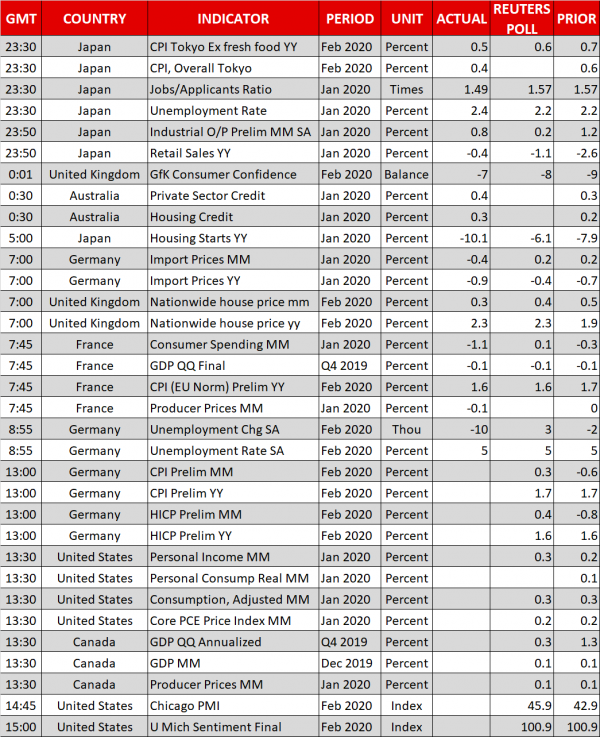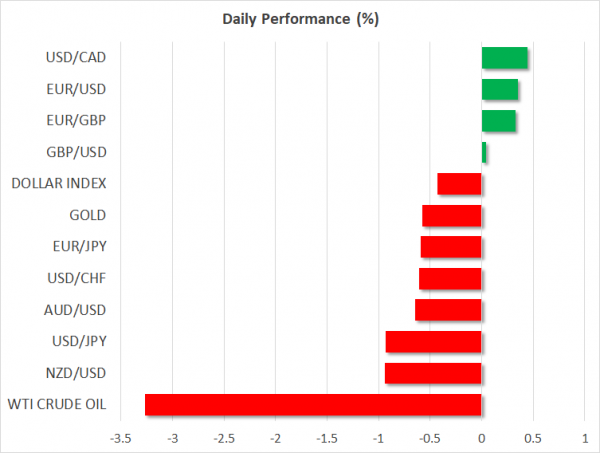- Global stocks fall apart amid growing fears of a virus-induced recession
- Yen and euro shine amid the mayhem, dollar and commodity currencies get hammered
- More de-risking possible today – Chinese PMIs and virus news over the weekend are a huge risk
Pandemic fears throw global markets into havoc
The worsening outlook for the world economy continues to torment financial markets. The major US stock indices fell by a staggering ~4.5% on Thursday, as investors increasingly price in the worst-case scenario where this virus turns into a pandemic and sparks a global recession, first by hitting supply chains and then by kneecapping consumption.
Asia followed Wall Street lower with Japanese stocks losing 3.7% today, Germany’s DAX 30 just opened 3.5% in the red, and futures point to another lower open in America. Strikingly, mounting expectations for more Fed stimulus have done little to halt the plunge. Markets are now fully discounting a quarter-point rate cut at the next meeting in March and also assign a ~30% chance for a larger, half-point cut at that gathering.
Stocks are probably right not to react much to rate-cut bets, because lower interest rates will do next to nothing to counter a supply side shock like this one, and even the positive effects on demand are questionable if entire economies start going into lockdown.
Yet, hopes for emergency Fed cuts have left their marks on the dollar, which continues its descent as rate differentials between the US and the rest of the world are narrowing, eroding its carry advantage. The yield on the 10-year Treasury hit another record low beneath 1.20% earlier today, as investors pile into the safety of US debt.
Euro and yen the big winners, aussie and kiwi reel
The main beneficiaries from the dollar’s retreat have been the yen and the euro, the latter displaying haven-like characteristics lately as several carry trades are unwound, returning money to the Eurozone. The euro also drew strength from reports that Germany is considering a fiscal stimulus package should the virus harm its already-fragile economy, with euro/dollar climbing back above $1.10.
Overall, this still seems like a rebound in euro/dollar, not a trend reversal. The recovery could continue so long as risk aversion is the name of the game, as investors unwind more carry trades. However, at some point one has to wonder who wants to own European assets in the face of a potential recession in Italy soon, which could infect the whole bloc at a time when its exports falter alongside global demand.
Across the risk spectrum, the biggest losers have been the commodity-linked currencies – namely, the Australian, Canadian, and New Zealand dollars. The aussie fell to a fresh 11-year low today, even against a greenback that is weak itself, as traders reassess the prospects for Australia’s export-heavy economy if this evolves into a global pandemic.
The Reserve Bank of Australia meets on Tuesday, and while it is unlikely to cut rates immediately, recent developments both domestically and globally have surely been dire enough for policymakers to strengthen their easing bias.
Risk aversion could persist today
The market’s mood is unlikely to improve today. China’s official PMIs for February – the first batch of data that will capture the virus impact – will be released over the weekend, so there’s a high risk that markets open with sharp gaps on Monday. Likewise, who knows what kind of negative virus headlines might hit over the weekend.
As such, investors could continue to ‘play defense’ today, cutting their exposure stocks and buying safer assets as they insulate their portfolios from the weekend’s event risk.
In terms of the data, there are some US and Canadian releases on the calendar today, but they may be seen as a little outdated since they reflect the period before the virus.

